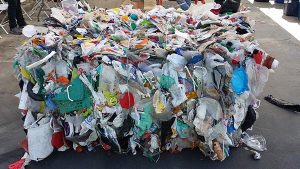
A bale of plastics No. 3-7. Source: Association of Plastic Recyclers.
The idling of a Baltimore-area plastic recovery facility is the kind of slowdown that’s expected in an innovative project showcasing a still-developing business model, according to a financial backer.
QRS Recycling and Canusa Hershman Recycling announced last week they will idle their joint-venture plastics recovery facility (PRF) in Dundalk, Md. The $15 million plant opened in November 2015, separating materials out of Nos. 3-7 mixed plastic bales. During its development, the facility secured a $2 million loan from the Closed Loop Fund, an investment fund that’s backed by corporate financing and seeks to catalyze recycling infrastructure projects through loans.
Rob Kaplan, managing director of the Closed Loop Fund, said the current expectation is the facility will idle only for a couple months and the short-term impact will likely be limited. In the long term, he said, the Closed Loop Fund believes the QRS PRF will be able to provide the market with a sustainable business model for recycling most mixed-plastic bales.
“When we helped finance it a couple years ago, it was the first of its kind, the first that had ever been put together with that type of process and that type of equipment under a single roof,” Kaplan told Plastics Recycling Update.
The way the operation tackles issues now could aid in the development of the wider industry in the future, Kaplan said. The Closed Loop Fund often looks for projects that serve as pilot projects to demonstrate the viability of a particular business model. The goal is to inject capital into a business and then replicate the work elsewhere once it has proved successful. The mechanics of the PRF model still need to be tweaked, Kaplan said, but that’s what Canusa Hershman and QRS are working on.
“Finding the right opportunity to capitalize the facility and put a business model together that will work in the long term is for the good of the model and is what we want to see,” Kaplan said.
Although Kaplan could not comment specifically on the QRS loan, he noted that the fund is still current with all of its loans.
Whatever the future holds for the Maryland PRF, its idling is indicative of an industry sector still in its early stages. A large percentage of 3-7 bales are still shipped out of the country for processing.
“I think it definitely puts a spotlight on the demand and the supply issues around 3-7s: Who really wants that material? Where is it coming from and what are the opportunities?” Kaplan said. “It’s a growing market and we expect to have these kinds of challenges along the way.”
More stories about plastics
- Colorado Summit for Recycling taps trending topics
- Plastic procurement tactics adapt to supply realities
- How AI imaging is helping MRFs and a reclaimer


